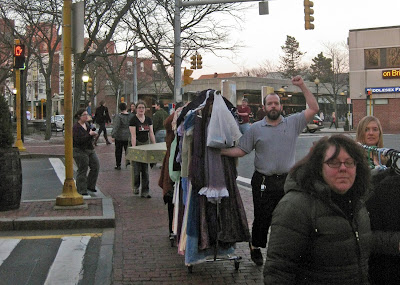What It Means to Be an All-Volunteer Community Theatre
 |
| Community theatre in action |
by Elizabeth Hunter, Artistic Director
One of the defining policies of Theatre@First is that we are an all-volunteer community theatre. No one gets paid to work with us. Not our actors, not our production staff, not our crew, and most especially not the Artistic Director.
No one pays to work with us, either. We do not have membership dues, or costume fees. While we love it when our participants sell program ads, or fill our audiences with ticket-buying friends and family, there is no requirement or minimum.
This policy has some disadvantages, of course. There are plenty of people who love theatre and make their living at it, which we respect and support. And there are people who feel that all theatre work should be paid, or that they cannot afford to devote so much of their time to non-paying endeavors. We miss out on working with those individuals. We have no leverage, other than the pleasure we offer of creating theatre in community, for encouraging people to join a production, or to stick with us from one show to the next. We don’t have money to offer as a way of recruiting particular individuals, or of declaring our priorities by devoting funds to equitable, antiracist hiring practices, for example. We are limited to doing what we can with whomever shows up.
Why don’t we pay people? The simple answer is that we can’t afford it. In our most financially successful show last year, if we had split the proceeds evenly after paying our expenses, each person listed in the program would have received $14.38.
There are certainly advantages to being an all-volunteer theatre community. We can produce theatre much more cheaply than professional companies, for one thing. That allows us to keep our ticket prices very affordable. We are able to operate supported almost exclusively by ticket sales, which gives us resiliency during times when grant-funded organizations have struggled. No one’s livelihood depends on us. Our taxes are pretty simple. We avoid pay inequities completely, and mitigate the development of hierarchy and stratification within the organization.
Most importantly, there is no financial advantage to keeping our numbers small, so we are able to build our community and welcome newcomers at any time. There is no business case for doing Shakespeare with a five-person cast, or for not having five people on our costuming team. There is constant flow between roles, as the props designer on one show may be the lead actor in another, and the director of this production may help out as a makeup assistant for the next. If there are skills that people are interested in learning, they are encouraged to shadow more experienced team members and to attend free workshops designed to share our knowledge and skills across the organization.
We acknowledge that our all-volunteer policy creates a major obstacle for those who cannot volunteer their time, for whatever reason. We hope that it also eliminates barriers that may otherwise prevent people from doing theatre: at Theatre@First there is no requirement of previous experience, no need for a polished resume or headshot, and no commitment beyond the scope of the show. People can do one show with us, or twenty; they can take a break for a year, or five, and be welcome and remembered when they return. Most of our participants have other jobs, so we don’t hold rehearsals during normal business hours and can generally schedule around work and other commitments.
So where does the money go? Most of our revenue pays our operating expenses, the costs of actually doing shows--money spent on set, costumes, make-up as well as the performance rights and space rental for rehearsals and performances. We also buy lighting and other equipment, and pay for things like insurance, storage, and other expenses not related to specific productions. Whatever is left provides us with a financial cushion for hard times, like a string of unprofitable shows, a global recession, or a pandemic shutdown. The money that we earn together ensures that there will be theatre here the next time you want to be involved.



Comments
Post a Comment